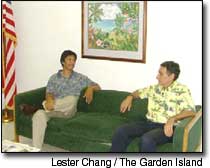LIHU‘E — Images of the fatal helicopter crash in Iraq that killed several Hawai‘ibased Marines brought back haunting memories for many Kauaians who fought in Vietnam, Kauai Vet Center social workers said. It is up to the Kauai Vet Center’s
LIHU‘E — Images of the fatal helicopter crash in Iraq that killed several Hawai‘ibased Marines brought back haunting memories for many Kauaians who fought in Vietnam, Kauai Vet Center social workers said.
It is up to the Kauai Vet Center’s Romy Castillo, team leader and social worker, and Joseph Uliano, social worker, to help those veterans work through those anxious feelings which may be classified as post traumatic stress disorder (PTSD).
The intensity of discussions among Vietnamera veterans who were treated for PTSD in groups at the Kauai Vet Center went up after last month’s crash of a U.S. Marine transport helicopter in Iraq in which 31 U.S. troops died, Castillo said.
“There were guys in Vietnam who were transported in helicopters, and they remembered that time,” Castillo said.
Castillo said he and Uliano, as social workers, can conduct assessments of veterans suspected of having PTSD, and can provide individual or groupcounseling sessions.
“For individual counseling, we see how the PTSD has affected the person,” Castillo said. “Some people have nightmares, intrusive thoughts, avoidance, strong feelings and guilt.” The men craft the treatment based on PTSD symptoms.
Castillo said he and Uliano also pass out literature “so that they (veterans with the disorder) know how it affects them.”
PTSD can occur at any time, without warning, Castillo said.
“For those coming back from the war, we try to see what they went through, so we can treat them early,” Castlllo said. “This way, people don’t develop negative coping (mechanisms, such as substance abuse or avoiding people),” Castillo said.
Kauai Vet Center staffers, instead, “teach them the healthy way of dealing with the condition,” Castillo said. Some of the treatment includes stress and anger management, he said.
“We can deal with the emotions, and we can train them (to deal with PTSD),” Castillo said. “But the memories can’t be erased.”
In severe PTSD cases, psychiatrists can administer medication, Castlllo said.
In even more severe cases, Kaua‘i veterans with the disorder may be and have been sent to a PTSD residential rehabilitation program in Hilo on the Big Island.
The program involves the use of a 16bed facility that is administered by VA officials, Castillo said. Kaua‘i veterans who return from the treatment there return to the Kauai Vet Center for followup treatment, Castillo said.
The psychiatric disorder can occur after witnessing lifethreatening events such as military combat, death, natural disasters, terrorist acts, serious accidents, or violent personal assaults like rape.
Written accounts of symptoms similar to those connected with PTSD go back to ancient times. Careful research and documentation of the disorder began after the Vietnam War.
Castillo said staffers at the Kauai Vet Center have treated hundreds of people for PTSD since the facility opened in 1988. Those include veterans who served as far back as World War II.
“The current literature coming from national (government sources) is that 16 to 17 percent of the soldiers coming back from Iraq will have PTSD,” Castillo said.
“An anticipated 30 percent will be affected by the war, psychologically and emotionally.”
Treatment is critical, as some veterans have seriously injured or killed others, according to Castillo and national news accounts.
The Kauai Vet Center staff saw an increase in PTSD cases with the invasion of Iraq in March 2003, Castillo said.
Staffers at the Kauai Vet Center also offer marital and family counseling for spouses or family members with husbands and fathers with PTSD, Castillo said. The center is located on Kuhio Highway across from Wilcox Memorial Hospital in Lihu‘e.
Lester Chang, staff writer, may be reached at 2453681 (ext. 225) or mailto:lchang@pulitzer.net.


